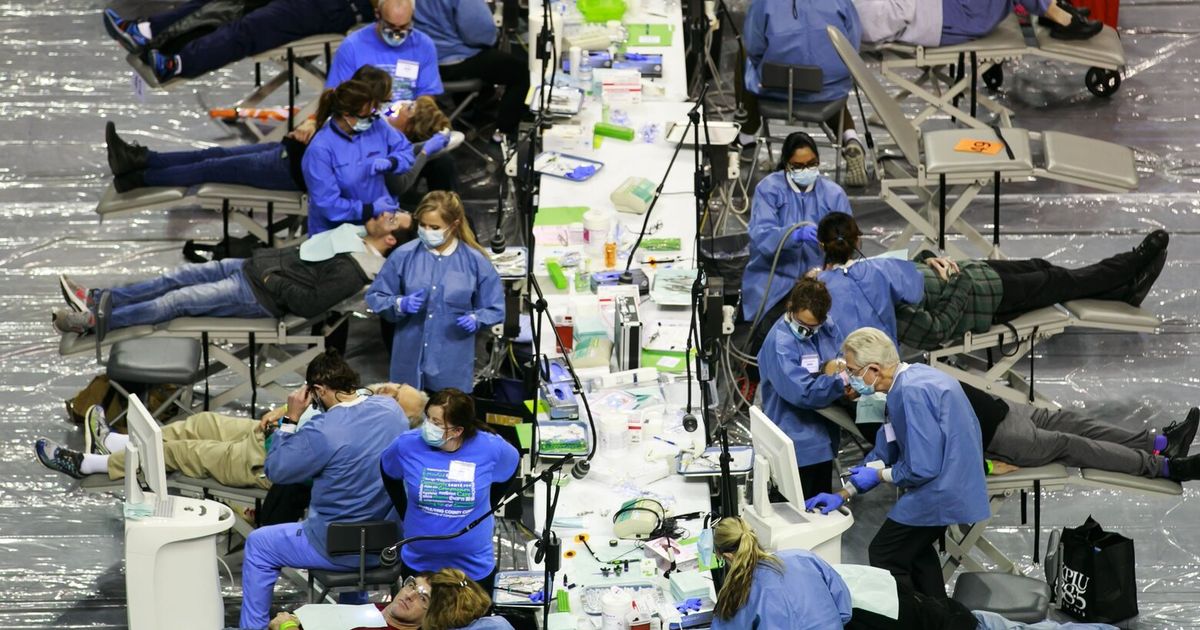The Seattle Times has correctly identified a major health problem in Washington: how dental insurance practices limit access to high-quality, affordable oral health care [“Seattle-area dental insurance is ‘like a joke.’ But few are smiling,” June 14, Business].
The American Dental Association, Washington State Dental Association and local dental societies are committed to increasing access to care for everyone in the state. Our members participate in free clinics around the state, and on any given day in Washington, you’ll find dentists visiting schools, traveling to underserved communities in mobile clinics, or in their offices, providing uncompensated care to those in need.
We both have provided volunteer care and know firsthand what a difference dental care can make in people’s lives. But volunteer efforts alone are not enough to solve this problem. That’s why dental organizations support the new School of Dental Medicine at Pacific Northwest University of Health Sciences in Yakima, scheduled to open in fall 2025. PNWU will not only increase the number of new dentists, but its innovative educational model will place dental students in three federally qualified health centers in Kennewick, Tacoma and Yakima to care for underserved populations.
Similarly, we supported increased state funding to expand the University of Washington School of Dentistry’s Regional Initiatives in Dental Education program. RIDE students begin their training in Spokane and then move to rural areas to complete their educations. Most go on to practice in rural communities, where the need is also great and challenging to fulfill.
Beyond education strategies to increase the number of practicing dentists, Washington must address underlying issues with dental benefits pointed out in the article. Private dental “insurance,” whether provided by an employer or purchased directly by a patient, is not actually insurance. It’s a prepaid benefits plan typically paying a larger share of costs for the least expensive care and a smaller percentage on more expensive and complex procedures. Plans have maintained the same annual benefit maximums (typically $1,500 to $2,000) for decades.
While comprehensive reform is needed, one important step the Legislature could take next session is to enact legislation ensuring that patients are getting their money’s worth from the premiums they pay. They could do that by requiring that at least 83% of the money insurance companies collect be spent on actual dental care. Plans that are unable or unwilling to meet that percentage would either have to issue refunds or be prohibited from operating in Washington.
This simple requirement, overwhelmingly adopted by a 2022 ballot measure in Massachusetts, would prevent dental insurers from spending an inappropriate percentage of premium dollars on higher administrative expenses, lavish executive salaries and heftier corporate profits. It would also curb the current practice of offering less desirable plans to individuals and small businesses to subsidize more generous benefits for those in large employer groups. Most important, it would reduce consumers’ out-of-pocket expenses for care.
Washington provides public dental benefits through its Medicaid program. We applaud the investments that the Legislature made in recent years to increase funding for pediatric and adult care in these chronically underfunded programs. But these increases have effectively only taken reimbursements from 25% to around 45% of average commercial reimbursement rates. We remain committed to working with all stakeholders to improve the state’s dental Medicaid program.
Finally, lawmakers should help reduce the serious dental hygienist shortage that limits access to important preventive care and drives up costs. They can do that by creating a new license for dental assistants who perform basic preventive care. This model, used in tribal communities, would allow existing hygienists, who are in increasingly short supply, to focus on the more complex procedures they are trained to perform. It would also provide a realistic career ladder for more young people looking to build careers in dentistry and help attract a more diverse workforce to serve all patients.
Access to quality, affordable oral health care is a major issue in Washington. As dentists, we urge the Legislature to continue our partnership in fighting this fight.
